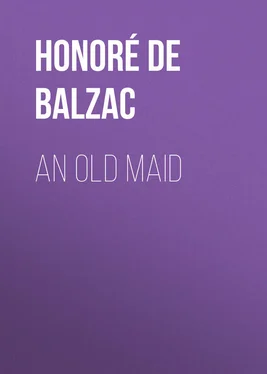Honoré Balzac - An Old Maid
Здесь есть возможность читать онлайн «Honoré Balzac - An Old Maid» — ознакомительный отрывок электронной книги совершенно бесплатно, а после прочтения отрывка купить полную версию. В некоторых случаях можно слушать аудио, скачать через торрент в формате fb2 и присутствует краткое содержание. Жанр: literature_19, foreign_antique, foreign_prose, на английском языке. Описание произведения, (предисловие) а так же отзывы посетителей доступны на портале библиотеки ЛибКат.
- Название:An Old Maid
- Автор:
- Жанр:
- Год:неизвестен
- ISBN:нет данных
- Рейтинг книги:4 / 5. Голосов: 1
-
Избранное:Добавить в избранное
- Отзывы:
-
Ваша оценка:
- 80
- 1
- 2
- 3
- 4
- 5
An Old Maid: краткое содержание, описание и аннотация
Предлагаем к чтению аннотацию, описание, краткое содержание или предисловие (зависит от того, что написал сам автор книги «An Old Maid»). Если вы не нашли необходимую информацию о книге — напишите в комментариях, мы постараемся отыскать её.
An Old Maid — читать онлайн ознакомительный отрывок
Ниже представлен текст книги, разбитый по страницам. Система сохранения места последней прочитанной страницы, позволяет с удобством читать онлайн бесплатно книгу «An Old Maid», без необходимости каждый раз заново искать на чём Вы остановились. Поставьте закладку, и сможете в любой момент перейти на страницу, на которой закончили чтение.
Интервал:
Закладка:
The chevalier had repudiated the ridiculous costume still preserved by certain monarchical old men; he had frankly modernized himself. He was always seen in a maroon-colored coat with gilt buttons, half-tight breeches of poult-de-soie with gold buckles, a white waistcoat without embroidery, and a tight cravat showing no shirt-collar, – a last vestige of the old French costume which he did not renounce, perhaps, because it enabled him to show a neck like that of the sleekest abbe. His shoes were noticeable for their square buckles, a style of which the present generation has no knowledge; these buckles were fastened to a square of polished black leather. The chevalier allowed two watch-chains to hang parallel to each other from each of his waistcoat pockets, – another vestige of the eighteenth century, which the Incroyables had not disdained to use under the Directory. This transition costume, uniting as it did two centuries, was worn by the chevalier with the high-bred grace of an old French marquis, the secret of which is lost to France since the day when Fleury, Mole’s last pupil, vanished.
The private life of this old bachelor was apparently open to all eyes, though in fact it was quite mysterious. He lived in a lodging that was modest, to say the best of it, in the rue du Cours, on the second floor of a house belonging to Madame Lardot, the best and busiest washerwoman in the town. This circumstance will explain the excessive nicety of his linen. Ill-luck would have it that the day came when Alencon was guilty of believing that the chevalier had not always comported himself as a gentleman should, and that in fact he was secretly married in his old age to a certain Cesarine, – the mother of a child which had had the impertinence to come into the world without being called for.
“He had given his hand,” as a certain Monsieur du Bousquier remarked, “to the person who had long had him under irons.”
This horrible calumny embittered the last days of the dainty chevalier all the more because, as the present Scene will show, he had lost a hope long cherished to which he had made many sacrifices.
Madame Lardot leased to the chevalier two rooms on the second floor of her house, for the modest sum of one hundred francs a year. The worthy gentleman dined out every day, returning only in time to go to bed. His sole expense therefore was for breakfast, invariably composed of a cup of chocolate, with bread and butter and fruits in their season. He made no fire except in the coldest winter, and then only enough to get up by. Between eleven and four o’clock he walked about, went to read the papers, and paid visits. From the time of his settling in Alencon he had nobly admitted his poverty, saying that his whole fortune consisted in an annuity of six hundred francs a year, the sole remains of his former opulence, – a property which obliged him to see his man of business (who held the annuity papers) quarterly. In truth, one of the Alencon bankers paid him every three months one hundred and fifty francs, sent down by Monsieur Bordin of Paris, the last of the procureurs du Chatelet . Every one knew these details because the chevalier exacted the utmost secrecy from the persons to whom he first confided them.
Monsieur de Valois gathered the fruit of his misfortunes. His place at table was laid in all the most distinguished houses in Alencon, and he was bidden to all soirees. His talents as a card-player, a narrator, an amiable man of the highest breeding, were so well known and appreciated that parties would have seemed a failure if the dainty connoisseur was absent. Masters of houses and their wives felt the need of his approving grimace. When a young woman heard the chevalier say at a ball, “You are delightfully well-dressed!” she was more pleased at such praise than she would have been at mortifying a rival. Monsieur de Valois was the only man who could perfectly pronounce certain phrases of the olden time. The words, “my heart,” “my jewel,” “my little pet,” “my queen,” and the amorous diminutives of 1770, had a grace that was quite irresistible when they came from his lips. In short, the chevalier had the privilege of superlatives. His compliments, of which he was stingy, won the good graces of all the old women; he made himself agreeable to every one, even to the officials of the government, from whom he wanted nothing. His behavior at cards had a lofty distinction which everybody noticed: he never complained; he praised his adversaries when they lost; he did not rebuke or teach his partners by showing them how they ought to have played. When, in the course of a deal, those sickening dissertations on the game would take place, the chevalier invariably drew out his snuff-box with a gesture that was worthy of Mole, looked at the Princess Goritza, raised the cover with dignity, shook, sifted, massed the snuff, and gathered his pinch, so that by the time the cards were dealt he had decorated both nostrils and replaced the princess in his waistcoat pocket, – always on his left side. A gentleman of the “good” century (in distinction from the “grand” century) could alone have invented that compromise between contemptuous silence and a sarcasm which might not have been understood. He accepted poor players and knew how to make the best of them. His delightful equability of temper made many persons say, —
“I do admire the Chevalier de Valois!”
His conversation, his manners, seemed bland, like his person. He endeavored to shock neither man nor woman. Indulgent to defects both physical and mental, he listened patiently (by the help of the Princess Goritza) to the many dull people who related to him the petty miseries of provincial life, – an egg ill-boiled for breakfast, coffee with feathered cream, burlesque details about health, disturbed sleep, dreams, visits. The chevalier could call up a languishing look, he could take on a classic attitude to feign compassion, which made him a most valuable listener; he could put in an “Ah!” and a “Bah!” and a “What DID you do?” with charming appropriateness. He died without any one suspecting him of even an allusion to the tender passages of his romance with the Princess Goritza. Has any one ever reflected on the service a dead sentiment can do to society; how love may become both social and useful? This will serve to explain why, in spite of his constant winning at play (he never left a salon without carrying off with him about six francs), the old chevalier remained the spoilt darling of the town. His losses – which, by the bye, he always proclaimed, were very rare.
All who know him declare that they have never met, not even in the Egyptian museum at Turin, so agreeable a mummy. In no country in the world did parasitism ever take on so pleasant a form. Never did selfishness of a most concentrated kind appear less forth-putting, less offensive, than in this old gentleman; it stood him in place of devoted friendship. If some one asked Monsieur de Valois to do him a little service which might have discommoded him, that some one did not part from the worthy chevalier without being truly enchanted with him, and quite convinced that he either could not do the service demanded, or that he should injure the affair if he meddled in it.
To explain the problematic existence of the chevalier, the historian, whom Truth, that cruel wanton, grasps by the throat, is compelled to say that after the “glorious” sad days of July, Alencon discovered that the chevalier’s nightly winnings amounted to about one hundred and fifty francs every three months; and that the clever old nobleman had had the pluck to send to himself his annuity in order not to appear in the eyes of a community, which loves the main chance, to be entirely without resources. Many of his friends (he was by that time dead, you will please remark) have contested mordicus this curious fact, declaring it to be a fable, and upholding the Chevalier de Valois as a respectable and worthy gentleman whom the liberals calumniated. Luckily for shrewd players, there are people to be found among the spectators who will always sustain them. Ashamed of having to defend a piece of wrong-doing, they stoutly deny it. Do not accuse them of wilful infatuation; such men have a sense of their dignity; governments set them the example of a virtue which consists in burying their dead without chanting the Misere of their defeats. If the chevalier did allow himself this bit of shrewd practice, – which, by the bye, would have won him the regard of the Chevalier de Gramont, a smile from the Baron de Foeneste, a shake of the hand from the Marquis de Moncade, – was he any the less that amiable guest, that witty talker, that imperturbable card-player, that famous teller of anecdotes, in whom all Alencon took delight? Besides, in what way was this action, which is certainly within the rights of a man’s own will, – in what way was it contrary to the ethics of a gentleman? When so many persons are forced to pay annuities to others, what more natural than to pay one to his own best friend? But Laius is dead —
Читать дальшеИнтервал:
Закладка:
Похожие книги на «An Old Maid»
Представляем Вашему вниманию похожие книги на «An Old Maid» списком для выбора. Мы отобрали схожую по названию и смыслу литературу в надежде предоставить читателям больше вариантов отыскать новые, интересные, ещё непрочитанные произведения.
Обсуждение, отзывы о книге «An Old Maid» и просто собственные мнения читателей. Оставьте ваши комментарии, напишите, что Вы думаете о произведении, его смысле или главных героях. Укажите что конкретно понравилось, а что нет, и почему Вы так считаете.












